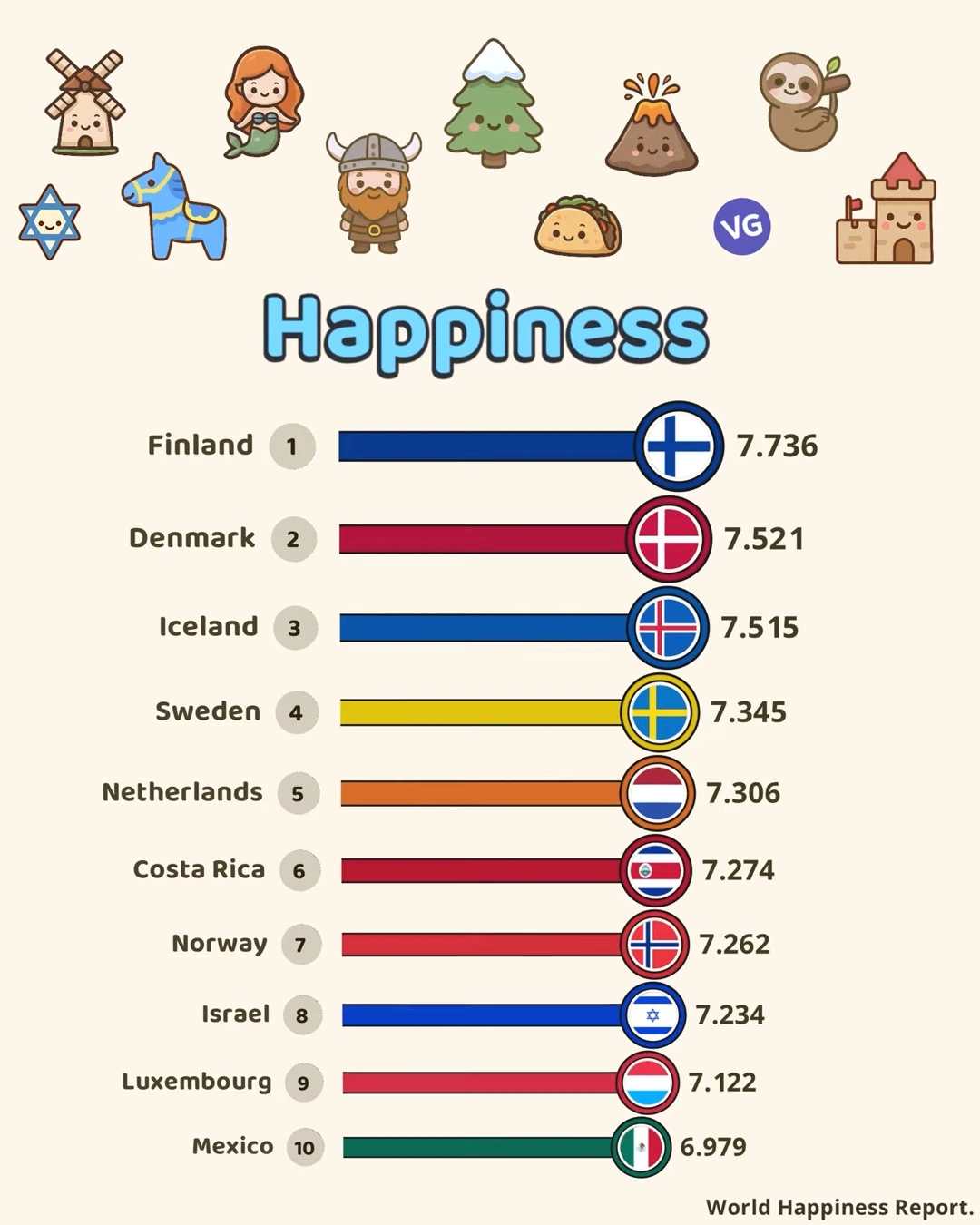Happiness is a complex and multifaceted concept that extends beyond personal emotions. It is influenced by economic stability, social support, life expectancy, and overall quality of life. Each year, the World Happiness Report ranks countries based on these factors, providing valuable insights into the happiest nations on Earth. In 2025, the top 10 happiest countries have once again demonstrated what it takes to create a thriving society.
| Rank | Country & Flag | Happiness Score |
|---|---|---|
| 1 | 🇫🇮 Finland | 7.736 |
| 2 | 🇩🇰 Denmark | 7.521 |
| 3 | 🇮🇸 Iceland | 7.515 |
| 4 | 🇸🇪 Sweden | 7.345 |
| 5 | 🇳🇱 Netherlands | 7.306 |
| 6 | 🇨🇷 Costa Rica | 7.274 |
| 7 | 🇳🇴 Norway | 7.262 |
| 8 | 🇮🇱 Israel | 7.234 |
| 9 | 🇱🇺 Luxembourg | 7.122 |
| 10 | 🇲🇽 Mexico | 6.979 |
Top 10 Happiest Countries in 2025
According to the latest World Happiness Report, the following countries rank highest in global happiness:
- Finland – 7.736
- Denmark – 7.521
- Iceland – 7.515
- Sweden – 7.345
- Netherlands – 7.306
- Costa Rica – 7.274
- Norway – 7.262
- Israel – 7.234
- Luxembourg – 7.122
- Mexico – 6.979
Why Are These Countries the Happiest?
Several key factors contribute to the high happiness scores of these nations:
1. Strong Social Support
Countries like Finland, Denmark, and Iceland prioritize community well-being and foster strong social connections. Citizens feel supported by their governments and communities, creating a sense of belonging and security.
2. Economic Stability and Income Equality
Nordic countries consistently rank high due to their strong economies and relatively low levels of income inequality. Universal healthcare, social welfare programs, and accessible education contribute to their overall happiness.
3. Work-Life Balance
In nations such as Sweden and the Netherlands, work-life balance is a top priority. Policies that emphasize shorter workweeks, generous parental leave, and flexible work environments contribute to higher happiness levels.
4. Environmental Sustainability
Many of these nations prioritize sustainability, ensuring access to clean air, green spaces, and a strong commitment to climate action. Costa Rica, for instance, invests heavily in renewable energy and environmental conservation, which positively impacts its citizens’ happiness.
5. Quality Healthcare and High Life Expectancy
Access to universal healthcare and a high life expectancy are significant contributors to happiness. Countries with well-funded healthcare systems, such as Norway and Luxembourg, provide better overall well-being for their citizens.
The Least Happy Countries
At the other end of the spectrum, some countries struggle due to conflict, economic instability, and lack of social support. The least happy countries in 2025 include:
- Afghanistan (1.364) – Ranked the least happy due to ongoing conflicts, economic hardship, and instability.
- Sierra Leone (2.998) – Faces economic struggles and low life expectancy.
- Lebanon (3.188) – Political and economic crises have significantly impacted happiness levels.
- Malawi (3.260) – Affected by poverty and healthcare challenges.
- Zimbabwe (3.396) – Political and economic instability contribute to its low ranking.
Factors Influencing Happiness
The World Happiness Report considers multiple factors, including:
- GDP per capita – Economic stability and income levels.
- Social support – Strong community networks and family support.
- Life expectancy – Quality healthcare and living conditions.
- Freedom to make life choices – Democratic values and personal autonomy.
- Generosity – Charitable donations and community engagement.
- Corruption levels – Trust in government and institutions.
Mexico’s Unique Position in the Top 10
One of the most surprising entries in the top 10 is Mexico. Despite economic challenges, Mexico has a rich cultural heritage, strong family ties, and a resilient society. Its emphasis on social bonds, festivities, and optimism helps keep its happiness levels high compared to other nations.
Conclusion
The happiest countries in 2025 demonstrate that well-being is about more than just wealth. Social support, economic stability, work-life balance, environmental consciousness, and healthcare access all play crucial roles in determining national happiness. As other nations seek to improve their citizens’ well-being, they can learn valuable lessons from the success of these top-ranking countries.
Source:
World Happiness Report 2025 – worldhappiness.report
